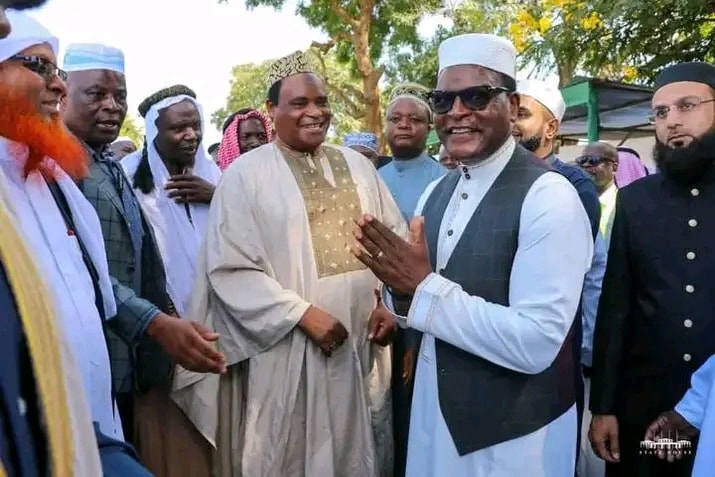“This is for the first time in history.”
Those seven words from Sheikh Dinala Chabulika, Publicity Secretary of the Muslim Association of Malawi (MAM), capture the magnitude of what just happened. After six decades of independence, after countless applications and appeals, after years of having to choose between faith and work, Malawi’s Muslims have finally achieved what once seemed impossible: official government recognition of Eid al-Adha as a national public holiday.
And the man who delivered this historic victory? Reverend Lazarus Chakwera—the very Pentecostal preacher they once feared would turn Malawi into a Christian state.
When the Ministry of Local Government announced that Monday, June 9, 2025 would be observed as a public holiday for Eid al-Adha, celebrations erupted from Lilongwe to Mzuzu, Blantyre to Mangochi. Mosques buzzed with excitement. WhatsApp groups exploded with congratulatory messages. For the first time in their lives, Muslim parents could tell their children they wouldn’t miss school to observe their holiest day. Workers wouldn’t have to choose between their paycheques and their prayers.
“We submitted our application to the government and they had a right to say yes or no, but they have chosen to say yes,” Sheikh Chabulika explains, his excitement palpable. “So we are really happy with this development.”
This isn’t just policy—it’s vindication. It’s proof that a Christian president can deliver for Muslim citizens in ways that decades of other leaders never managed.
When Chakwera first ran for president in 2019, the anxiety in Muslim communities was real and raw. Here was a man whose background screamed everything they feared: Assemblies of God reverend, MCP stalwart, Christian through and through. Propaganda spread like wildfire claiming he would declare Malawi a Christian nation like Zambia. The whispers in mosques were ominous: “This is our Zambia moment.”
But Chakwera didn’t just prove those fears wrong—he obliterated them. In four short years, he has appointed Muslims to more key government positions than any president since Bakili Muluzi. From a presidential advisor on Islamic affairs to strategic diplomatic posts and parastatal board positions. He reversed Malawi’s UN vote on Gaza after Muslim protests, personally participated in Muslim events and worn traditional Islamic attire during Eid celebrations, and now delivered the ultimate recognition by making Eid al-Adha a national holiday.
“We are very excited,” Sheikh Chabulika emphasizes, and you can hear why. This represents everything the Muslim community has worked toward—full recognition, equal treatment, and the dignity of having their most sacred observance honoured by the entire nation.
The Eid al-Adha holiday declaration isn’t just ceremonial—it’s transformational. For generations, Muslim families have faced an impossible choice during their holiest celebrations. Parents had to take unpaid leave or risk their jobs. Students missed crucial school days. The economic burden was real, the social exclusion painful.
Now, for the first time, Muslim children will wake up on Eid knowing their entire country is celebrating with them. Muslim workers won’t lose pay to observe their faith. Muslim families won’t feel like second-class citizens on their most important day.
“This is for the first time in history,” Sheikh Chabulika repeats, and the weight of those words is profound. Sixty years of independence. Dozens of leaders. Countless applications. And it took a Pentecostal president to finally say yes.
Others might perceive this as politics. For Muslims, this is pure victory—the vindication of generations who dreamed of this moment but never lived to see it.
This victory sends shockwaves through Malawi’s political landscape. For decades after Bakili Muluzi’s presidency, Muslim political identity was virtually synonymous with the United Democratic Front (UDF). The assumption was simple: only Muslim leaders truly understand Muslim needs.
Chakwera has shattered that assumption completely. He’s proven that responsiveness matters more than religious identity, that actions speak louder than faith backgrounds, that inclusive governance can transcend denominational lines.
The timing is particularly significant. With elections approaching in 2025, this historic victory positions Chakwera as the president who didn’t just promise Muslim inclusion—he delivered their greatest triumph in six decades.
Opposition parties now face a daunting question: How do you compete with a leader who just gave Muslims something no one else in history managed to achieve?
In the end, Sheikh Chabulika’s joy tells the whole story. Sixty years of waiting, of hoping, of being told “maybe next time”—and finally, gloriously, miraculously, a Pentecostal preacher looked at their application and said yes. “We are very excited,” he says, and in those simple words lies the triumph of a community that finally, truly, belongs.




















